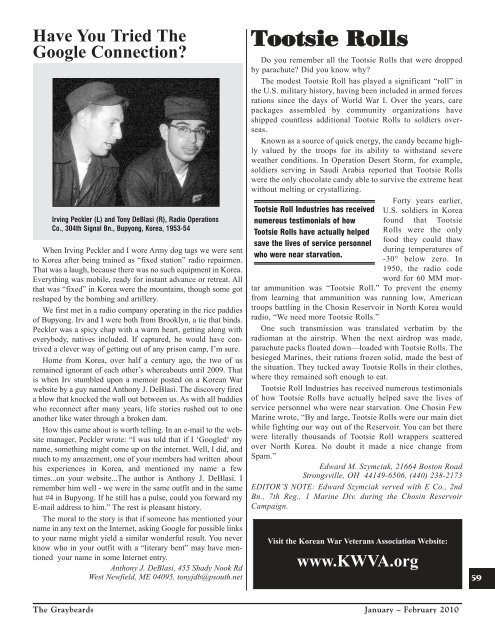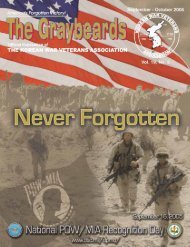Jan/Feb 2010 - Korean War Veterans Association
Jan/Feb 2010 - Korean War Veterans Association
Jan/Feb 2010 - Korean War Veterans Association
You also want an ePaper? Increase the reach of your titles
YUMPU automatically turns print PDFs into web optimized ePapers that Google loves.
Have You Tried The<br />
Google Connection?<br />
Irving Peckler (L) and Tony DeBlasi (R), Radio Operations<br />
Co., 304th Signal Bn., Bupyong, Korea, 1953-54<br />
When Irving Peckler and I wore Army dog tags we were sent<br />
to Korea after being trained as “fixed station” radio repairmen.<br />
That was a laugh, because there was no such equipment in Korea.<br />
Everything was mobile, ready for instant advance or retreat. All<br />
that was “fixed” in Korea were the mountains, though some got<br />
reshaped by the bombing and artillery.<br />
We first met in a radio company operating in the rice paddies<br />
of Bupyong. Irv and I were both from Brooklyn, a tie that binds.<br />
Peckler was a spicy chap with a warm heart, getting along with<br />
everybody, natives included. If captured, he would have contrived<br />
a clever way of getting out of any prison camp, I’m sure.<br />
Home from Korea, over half a century ago, the two of us<br />
remained ignorant of each other’s whereabouts until 2009. That<br />
is when Irv stumbled upon a memoir posted on a <strong>Korean</strong> <strong>War</strong><br />
website by a guy named Anthony J. DeBlasi. The discovery fired<br />
a blow that knocked the wall out between us. As with all buddies<br />
who reconnect after many years, life stories rushed out to one<br />
another like water through a broken dam.<br />
How this came about is worth telling. In an e-mail to the website<br />
manager, Peckler wrote: “I was told that if I ‘Googled‘ my<br />
name, something might come up on the internet. Well, I did, and<br />
much to my amazement, one of your members had written about<br />
his experiences in Korea, and mentioned my name a few<br />
times...on your website...The author is Anthony J. DeBlasi. I<br />
remember him well - we were in the same outfit and in the same<br />
hut #4 in Bupyong. If he still has a pulse, could you forward my<br />
E-mail address to him.” The rest is pleasant history.<br />
The moral to the story is that if someone has mentioned your<br />
name in any text on the Internet, asking Google for possible links<br />
to your name might yield a similar wonderful result. You never<br />
know who in your outfit with a “literary bent” may have mentioned<br />
your name in some Internet entry.<br />
Anthony J. DeBlasi, 455 Shady Nook Rd<br />
West Newfield, ME 04095, tonyjdb@psouth.net<br />
Tootsie Rolls<br />
Do you remember all the Tootsie Rolls that were dropped<br />
by parachute? Did you know why?<br />
The modest Tootsie Roll has played a significant “roll” in<br />
the U.S. military history, having been included in armed forces<br />
rations since the days of World <strong>War</strong> I. Over the years, care<br />
packages assembled by community organizations have<br />
shipped countless additional Tootsie Rolls to soldiers overseas.<br />
Known as a source of quick energy, the candy became highly<br />
valued by the troops for its ability to withstand severe<br />
weather conditions. In Operation Desert Storm, for example,<br />
soldiers serving in Saudi Arabia reported that Tootsie Rolls<br />
were the only chocolate candy able to survive the extreme heat<br />
without melting or crystallizing.<br />
Tootsie Roll Industries has received<br />
numerous testimonials of how<br />
Tootsie Rolls have actually helped<br />
save the lives of service personnel<br />
who were near starvation.<br />
Forty years earlier,<br />
U.S. soldiers in Korea<br />
found that Tootsie<br />
Rolls were the only<br />
food they could thaw<br />
during temperatures of<br />
-30° below zero. In<br />
1950, the radio code<br />
word for 60 MM mortar<br />
ammunition was “Tootsie Roll.” To prevent the enemy<br />
from learning that ammunition was running low, American<br />
troops battling in the Chosin Reservoir in North Korea would<br />
radio, “We need more Tootsie Rolls.”<br />
One such transmission was translated verbatim by the<br />
radioman at the airstrip. When the next airdrop was made,<br />
parachute packs floated down—loaded with Tootsie Rolls. The<br />
besieged Marines, their rations frozen solid, made the best of<br />
the situation. They tucked away Tootsie Rolls in their clothes,<br />
where they remained soft enough to eat.<br />
Tootsie Roll Industries has received numerous testimonials<br />
of how Tootsie Rolls have actually helped save the lives of<br />
service personnel who were near starvation. One Chosin Few<br />
Marine wrote, “By and large, Tootsie Rolls were our main diet<br />
while fighting our way out of the Reservoir. You can bet there<br />
were literally thousands of Tootsie Roll wrappers scattered<br />
over North Korea. No doubt it made a nice change from<br />
Spam.”<br />
Edward M. Szymciak, 21664 Boston Road<br />
Strongsville, OH 44149-6506, (440) 238-2173<br />
EDITOR’S NOTE: Edward Szymciak served with E Co., 2nd<br />
Bn., 7th Reg., 1 Marine Div. during the Chosin Reservoir<br />
Campaign.<br />
Visit the <strong>Korean</strong> <strong>War</strong> <strong>Veterans</strong> <strong>Association</strong> Website:<br />
www.KWVA.org<br />
59<br />
The Graybeards<br />
<strong>Jan</strong>uary – <strong>Feb</strong>ruary <strong>2010</strong>
















